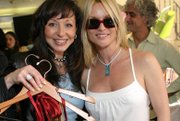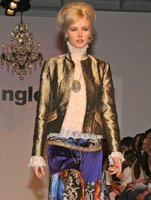California Cos. Look to Europe to Boost Sales
Daniella Clarke has expansion on her mind when it comes to beefing up sales of her fashion-forward collection, sold under the Frankie B. label. And the designer knows how she will do it: She’s going to Europe.
Clarke plans to sell her $140 blue jeans and $80 tops to high-end stores in England, France and Spain. The man in charge of this effort is Richard Freund, the company’s general manager, who has been weighing the best way to approach the continent.
“The time is right,” said Freund, who noted the company hopes to add an extra 20 percent in revenues by becoming an American label in Paris and London. “The interest in Europe for the California jean is tremendous.”
Freund’s first move was to select a number of distributors to buy goods from Frankie B. and then sell them to European stores. He has signed distributors in Spain, France, Switzerland and Scandinavia. They will help market the Los Angeles label’s low-rise jeans and flirty tops, which blend in well with the rock ’n’ roll crowd.
The price is right
For many California apparel companies like Frankie B., Europe is becoming an attractive export option now that a weak U.S. dollar makes American goods less expensive for continental consumers.
During the past five years, the dollar’s value has plummeted a little more than 36 percent. In April 2000, a $100 pair of American blue jeans cost 105 euros. Now that price tag has dropped to 77 euros.
There are other factors that make exporting to Europe attractive. For one, California’s renowned contemporary styling and casual lifestyle have won over young European customers. That is partially because Southern California companies such as Quiksilver, the surfwear clothing company and retailer, have a strong European presence. The company has dozens of free-standing stores in such cosmopolitan centers as Paris, London, Milan, Madrid and Berlin.
Now big European department stores, including Galerie Lafayette in Paris and Selfridges in London, are devoting more retail space to California fashion than before.
“One-half of the top floor of Harvey Nichols [department store] in London is devoted to California labels like ABS by Allen Schwartz, Juicy Couture, Velvet and Citizens of Humanity,” noted Galina Sobolev, whose Los Angeles company, Gala, produces a womenswear label called Single. “Several years ago, the stores might have Ralph Lauren or Donna Karan but none of the contemporary lines.”
Sobolev has stepped up her exports to Europe, which now make up about 15 percent of her $10 million in sales.
But she wants to increase that percentage. In February, she made a strategic decision. Instead of registering for ENK’s contemporary show Brighte Las Vegas, which held its first Las Vegas run in February, she took her sales force to England to participate in London Fashion Week. There she set up a booth inside a tent at Battersea Park, where the runway shows were being held inside another tent.
In London, she received inquiries from the Bon Marcheacute; chain of department stores in France, Fenwick in England and the Flairline Fashion Group in Ireland. For the past two years, she has been selling to Harvey Nichols and House of Fraser in England.
Sobolev, who runs her downtown Los Angeles business with her husband, Michael, is thinking of attending The White Show in Milan and the Bread & Butter show in Berlin to garner more European accounts.
“The pricing has absolutely helped,” noted Sobolev, who started her company nearly 10 years ago. “They still have [import] duties that are rather high, but I still think with all that, it is still a very attractive buy for them.”
Local connections
The European market is proving to be a boon for the recently launched Ed Hardy label, developed by Christian Audigier, formerly the head designer at Von Dutch. Audigier expects about 60 percent of his first year’s projected $20 million to $25 million in revenues to come from Europe because his trucker hats, T-shirts, shirts and pants that carry vintage tattoo designs are selling well in France, Germany and Italy. “It is very advantageous for European retailers to buy product from America because of the weak dollar,” said Audigier, who is a native of Avignon, France.
Audigier has a French partner take care of the European business for the Ed Hardy line, which is manufactured in Portugal, China and the United States.
To make selling to European retailers easier, Audigier set up a warehouse in Marseilles to ensure quick delivery. “When I was at Von Dutch, we were dealing with European people via phone, fax, and e-mail, which made it very difficult,” he said.
Setting up a warehouse in Europe is the best way to get goods quickly to retailers, said Marco DeGeorge, co-president and co-chief executive of Color Image Apparel Inc., a Commerce, Calif.–based company known for its girls’ and women’s blank T-shirt and fleece apparel label, Bella. The 6-year-old label makes up 80 percent of the company’s revenues.
Color Image, started in 1992 to provide private-label apparel for companies such as Gap Inc. and Levi Strauss & Co., began exporting to Europe at the beginning of 2004 after feeling there was a niche for its product, which uses different fabrics and colors than those found in Europe. The company set up a detailed plan six months before shipping, and it paid off. “Europe as a market has been great,” DeGeorge said.
Color Image has 60,000 square feet of warehouse space in Belgium, which enables it to ship goods to retailers in two to three days. Bella has distributors in Holland, England, Belgium, France, Germany, Hungary, Italy, Spain and Sweden. “European sales will make up maybe 8 to 10 percent of revenues for 2005, which is pretty good coming out of nowhere,” said DeGeorge, noting that the company expects revenues in 2005 to hit $75 million.
Tariff relief
One additional benefit for U.S. exporters this year is the European Union’s suspension of a tariff it had imposed in March 2004 on goods from the United States. The tariff started at 5 percent and increased 1 percent a month until it topped off at 17 percent.
The tariff was in retaliation for export subsidies given by the U.S. government to U.S. manufacturers. The World Trade Organization ruled the export subsidies were illegal, which prompted the EU tariff.
But late last year, Congress repealed the subsidies and the EU suspended the tariff.So if the dollar remains weak, American apparel should grow to be a strong seller in Europe.
“In general, European customers tend to embrace Los Angeles fashion trends,” Sobolev said. “California designers tend to push the envelope a little more.”























